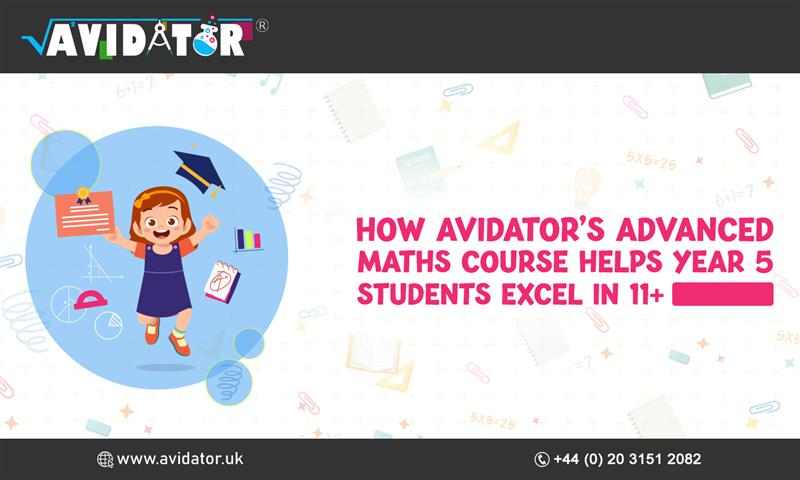Blog
How Avidator’s Advanced Maths Course Helps Year 5 Students Excel in 11+
- April 19, 2025
- Posted by: Avidator
- Category: 11+ exam Maths Workshop

Preparing for the 11+ exam can be a pivotal point in a student’s academic journey. It often marks the transition from general primary school learning to a more focused and strategic approach to problem-solving and advanced thinking. For Year 5 students, this is a time when a solid foundation in maths is not only beneficial, it’s essential.
Families seeking structured preparation can consider Avidator’s 11+ Advanced Maths Course. This blog outlines how the course is structured and highlights the ways it supports Year 5 students in building confidence, deepening understanding, and preparing steadily for the 11+ exam.
A Full-Year Programme, Divided for Progress
Rather than packing everything into a few weeks, Avidator spreads the course thoughtfully across the full academic year. They divide it into three terms to allow students to absorb concepts gradually. This structure helps avoid overwhelm and gives children the chance to revisit and consolidate their learning between terms.
Each term focuses on key areas that commonly appear in 11+ assessments. The progression across terms reflects how topics often build on each other. For instance, early sessions might cover whole numbers and fractions, setting the stage for more advanced topics like algebra and geometry in later months.
Weekly Routine with Flexibility
Students are expected to commit around four hours per week. Two of these hours are live sessions, scheduled across different batches to suit various family routines. The remaining hours can be used flexibly for self-paced practice and lab-style interactive exercises.
This balance between guided teaching and independent work can support different learning styles. Some students thrive with real-time feedback, while others benefit from the chance to work through problems at their own pace. Having both options in the course can create a more rounded experience.
Term 1: Building Core Concepts
The first term introduces essential topics such as whole numbers, factors, multiples, fractions, percentages, and early ratio concepts. These aren’t just basic skills, and they form the basis for solving multi-step problems and logical reasoning tasks that are frequently included in 11+ exam formats.
For many students, this term is a chance to revisit what they’ve already encountered in school, but with a deeper focus. Relearning with context and purpose, for example, seeing how a topic appears in test-style questions often encourages better retention.
Term 2: Expanding into New Territory
As the course moves into the second term, it gradually introduces concepts that are less commonly covered in depth at school. Topics like basic algebra, area and perimeter, and more advanced geometry require a shift in thinking.
The inclusion of conversions and decimal work also strengthens number sense. At this stage, students are starting to learn how to manipulate numbers and apply formulas. This is where problem-solving becomes more strategic, and the variety of question types helps them think from different angles.
Term 3: Exam-Focused Application
By the time students reach Term 3, they are usually more comfortable with the content and ready to start applying it in a timed setting. This part of the course includes practice with exam-style questions and mock tests, key components in getting used to the pressure of a real 11+ paper.
Time management is also introduced. It’s not just about knowing how to solve a problem, it’s about doing it efficiently under time constraints. This phase gives students the chance to identify which topics take longer and where they need more practice, all in a low-stress environment that allows for review and correction.
The Role of Interactive Labs and Practice
Apart from the main sessions, students also get access to interactive lab hours. The course team designed these to put concepts into action through activities, challenges, and collaborative exercises.
In addition, the option for 24 hours of self-paced practice gives students ample opportunity to repeat tricky topics or tackle additional problems. Regular exposure to a variety of question styles helps reduce the risk of surprises on the actual test day.
Flexibility with Batches
Avidator offers the course in multiple batches throughout the week, helping families find a schedule that fits. Whether it’s Monday and Tuesday, midweek evenings, or weekend slots, the variety allows learners to attend without interfering with school or extracurricular activities.
A Steady Approach to a Big Challenge
For Year 5 students, consistency is often more effective than intensity. Rather than cramming a lot of material into a short time, this course provides a measured pace that encourages deep understanding. The clear progression, coupled with regular opportunities for practice, makes it easier for learners to grow their confidence.
While every student is different, having a structured course that guides them through essential topics, introduces more advanced maths, and prepares them with real-style exam questions can be a useful part of the preparation journey.
